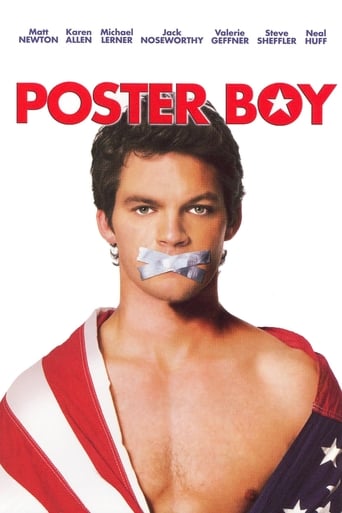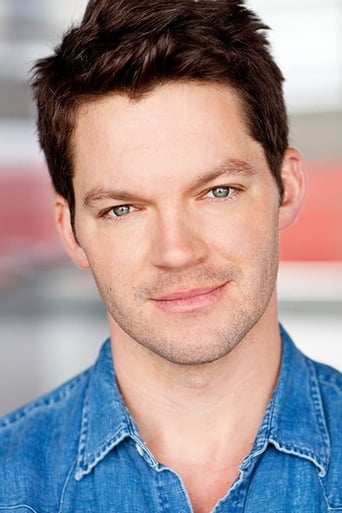Tacticalin
An absolute waste of money
Dynamixor
The performances transcend the film's tropes, grounding it in characters that feel more complete than this subgenre often produces.
ActuallyGlimmer
The best films of this genre always show a path and provide a takeaway for being a better person.
Ezmae Chang
This is a small, humorous movie in some ways, but it has a huge heart. What a nice experience.
markj-64
So, the hand cam got on my nerves rather quickly.Spent the first part of the movie trying to figure out what kind of film I was watching. The film is obviously set up to be a "worlds collide" situation. Perhaps I was expecting that those 2 worlds, or their separateness, would have been better defined from the beginning.The whole project comes off like an amateur attempt judging by the lack of polish. The lighting is crap. The camera work is distracting. The casting is good. The dialogue is effective but the plot jumped around too much for me to follow. Makes me feel like I have A.D.D.The technical flaws kept me out of the film and I was left with an overpowering sense of watching a film rather than experiencing it.
Brandt Sponseller
A technical quibble first: my hearing is less than perfect, and Poster Boy has a lot of mumbled dialogue with no subtitles on the DVD. New films without subtitles are just inexcusable in my opinion--what is someone who is deaf supposed to do? Just not watch that film? The best aspect of the film is the acting. The core cast are all fantastic. What didn't work so well for me was the cinematography, editing and the general low budget approach. The cinematography is mostly (or maybe all) hand-held, with a lot of shaky cam shots and a lot of blurriness. The film is loaded with overexposed shots and a dominance of white. While that may have been so for metaphorical reasons, it's not the most pleasant thing to watch aesthetically if it's relentless--and that's also not the best way to get the metaphorical aspects across. The editing is frequently frenetic. In combination with the locations, sets and general lack of music, Poster Boy has the feel of a 100-thousand dollar art house drama made by a director who is way too obsessed with The Blair Witch Project.Fortunately, the story is better than that would suggest, although it's not perfect. This would have been far more on-target and controversial 15 years ago (given our present knowledge and overall lack of reaction to the sexuality of some political offspring), but it's still engaging enough, especially given the performances, and at any rate, it deals with important issues that are still far from resolved in our culture.
BadGayFilms
I wrote a review of Poster Boy on my website (www.BadGayFilms.com) and you'll be surprised that me big issues with this movie aren't found in the gay plot lines (it was pretty typical of most gay films.) Here is some of what I had to say, be sure to check out the website for my full review:"...oddly enough my issues with this movie don't really come from the gay elements. For the most part the gay plot lines are pretty reasonable and believable though not very compelling. I'm only talking about the plot here mind you. The camera work will make you dizzy and the editing is sloppy. The actors do a decent job for the most part (Matt Newton as Henry Kray and Jack Noseworthy as Anthony) with some glaring exceptions (oddly enough Karen Allen as Eunice Kray and Ian Reed Kesler as Skip Franklin are pretty awful.)My true problem with this film is the very basis for which it is based. The whole plot centers on a political campaign and while most movies that attempt to portray a campaign tend to stumble, this one falls flat on its face."BadGayFilms.com
Merwyn Grote
The drama POSTER BOY begins with such a solid premise, the screenplay could have practically written itself. Perhaps it would have been better if it had. Though certainly well acted by some of the cast and directed by first-timer Zak Tucker with a degree of skill, the film is bogged down by its script; written by Lecia Rosenthal and Ryan Shiraki, it is laden with preachy platitudes and simple-minded stereotypes. You can sense that the writers weren't satisfied with just hoping to pen a good story, they wanted to make it an "important" film, which is all well and good, unless you sacrifice the drama for the dogma.Matt Newton plays Henry Kray, the college boy son of Jack Kray, an outspoken conservative senator facing a re-election vote. The son is gay and very much in the closet -- though apparently quite sexually active; while the father is a "family values" candidate with a history of particularly harsh and homophobic stands on various issues. The clueless Jack bullies Henry into being active in his re-election campaign as a way of reaching out to younger voters.This is a great start; especially if you add in a plot twist wherein Henry unknowingly has a one-night stand with Anthony, a gay rights activist who has a particularly strong dislike for Senator Jack, his politics and his political party. Henry finds himself caught between a father who wishes to exploit his son's youthful and apparently straight-arrow image and a lover who hopes to out him in a cheap attempt at embarrassing the father. This is a nice set up for a potentially complex drama, maybe even an intriguing thriller.Making an admirable effort to establish an Altmanesque feel to the film, director Tucker finds his attempts at realism at odds with the script that seems contrived and phony as the screenwriters fumble the material in infuriatingly inept ways. For one thing, as played with a perpetual snarl by Michael Lerner, Sen. Jack Kray isn't just a conservative, the story goes out of its way to make sure we know that he is (and by extension, all conservatives are) controlling and hypocritical and poor at parenting to boot. He isn't just a conservative, he is "the Nazi of North Carolina" whose campaign seemingly is financed by the tobacco industry. Gay issues aside, it is not surprising that Henry has great animosity toward his dad. And that is the problem: The film quells part of its strongest source of drama from scene one by obliterating even the slightest suggestion of there being a genuine loving bond between father and son. Indeed, the entire film is told via flashbacks as Henry spills his guts to a reporter in what seems to be a spiteful attempt to get back at his father.The film would be much more powerful had Henry been torn between two loves; one, his familial love of his father, and the other, his sexual attraction to his lover. The film would be so much more compelling (and believable) if Senator Kray were to be basically a good man with extreme beliefs or if Henry were to be a true believer in his father's politics, who had to face how it conflicts with the reality of his own sexuality. Or what if Sen. Kray were a liberal whose politically correct rhetoric masks a homophobic mind? And though Anthony and his fellow activists aren't shown in a particularly flattering light either, the story overly stacks the deck to the left by making Senator Kray an oh-so obvious right-wing villain in a tired attempt to make clear the film's already obvious left-leaning bias. The result is weak propaganda and even weaker drama.Worse, all the cheap political shots detract from the film's strongest relationship, between Newton's Henry and Jack Noseworthy's Anthony. Both actors give fine performances, helped considerably by the fact they are given the most realistic characters to play. Newton captures the anxiety of Henry, a guy who just wants to live his life out of the public eye, but finds the comfort that comes from living in the closet comes at a high price. Noseworthy makes credible a character who can't quite separate his sexuality from his politics, which, ironically, is the problem with the film itself. The film's most potent message would have been in exploring this love story rather than in focusing on all the yammering political noise that surrounds these two men.



